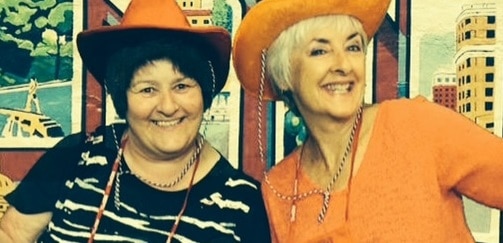(Note: HoH = Hard Of Hearing = Slang acronym for a person with hearing loss.)
You have hearing loss and you’re finally admitting you might need a bit of help – who you gonna call?
Maybe you mumble to your doctor something about your ears, perhaps it’s wax, or….
Maybe you take your neighbor’s advice and go directly to a hearing aid clinic – they’re everywhere these days – and have your hearing tested. Then, who knows, a hearing aid, or two….
Yes, but who are you going to talk to about all the other stuff? The stuff that helps people like you and me, the ones with hearing loss, get through the day. Or through our relationships, our jobs, our lives?
I’ll tell you who you should call: the people who’ve been around the “hearing loss block” a few times. They are everywhere, these walking goldmines of experience and opinions; they have tried many strategies and can share with you what’s true, what’s myth and what works. They are living the life with hearing loss and know that some strategies work better for different people, depending on degree of hearing loss, personality, etc. Even so, successful communication means going beyond the hearing aid and the cochlear implant to embrace tactics that work in partnership with our technology.
If you go where the HoHs are, if you attend a meeting, or a conference, or a lecture for people with hearing loss, you’ll find people who radiate compassion and understanding and knowledge – even a strong shoulder to lean on, if you need it. And it can be life-changing. I know this because, once, I needed this help. I needed practical advice to calm my fears about being a hard of hearing mom to a new baby.
This past weekend, I was the Keynote Speaker at Fresno State University’s “Silent Garden” event, an annual lecture for people with hearing loss. The room was looped, so that people could turn on their hearing aid and cochlear implant telecoils and have speakers’ voices come directly into their ears. One woman was attending her first-ever consumer hearing loss event; she had never met other people with hearing loss. She was a long-time user of hearing aids and a cochlear implant but had never used her telecoils. During a talk, she asked the person sitting beside her if the blue taped lines on the floor was the loop system the guy was talking about. Yes, it was. She almost jumped with the shock when she turned on her telecoils, first in her hearing aid, then her cochlear implant sound processor. She was blown away at what she was hearing (and I was in tears when she described her reaction to me): a powerful new means of access that she had never been told about.
So, where do you find these experienced folks?
You can ask a friend who seems to do well with their hearing loss. Ask your audiologist for a referral to a local hearing loss support group or other resources. Unfortunately, these groups exist only where two or three people have decided to start them. But many areas – especially in Europe and North America – have consumer-based organizations with chapters around the country.
These days, the internet allows us to interact with others in real-time via Skype and other platforms. There is an explosion of online resources for people with hearing loss. Many are created by hearing aid and cochlear implant manufacturers and while they offer excellent advice, it’s a good idea to also seek out consumer associations that have no financial stake in the information they offer.
A good place to start is the International Federation of People with Hearing Loss, which lists member associations around the world. Excellent groups inciude the Hearing Loss Association of America, the Canadian Hard of Hearing Association, and Action on Hearing Loss. In addition, there are many state and provincial service agencies serving people who are deaf and hard of hearing. Some consumer groups offer mentoring services.
Contact these support organizations. Tell them that you need information and support. These groups connect people with people and they are vital. When you talk to your audiologist for additional support, don’t accept “I don’t know’ for an answer. You hearing care professional should know.
And when you do get help and useful information, please consider supporting them in the future. They need our help to help others.

Great Access!
Featured Photo: Myrtle Barrett and I at a Hearing Loss Convention of America convention.
Photo, left, by Marilyn Weinhouse, at Fresno’s Silent Garden event for people with hearing loss.







